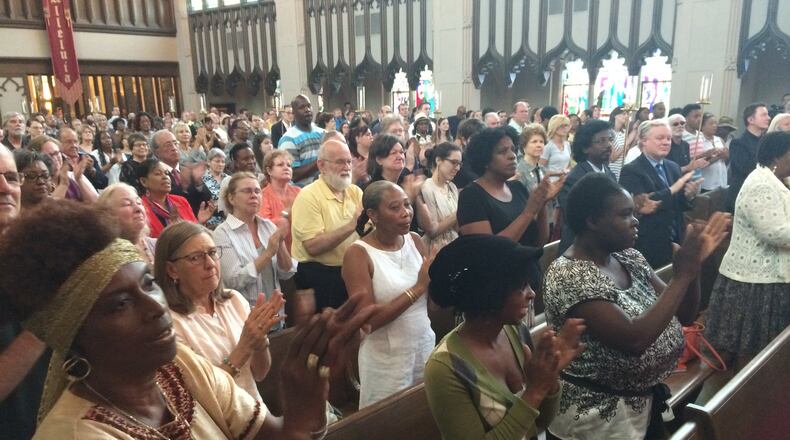The hymnal echoed throughout the cathedral as dozens of clergy members silently filed in. Priests, pastors, rabbis and imams sat shoulder-to-shoulder in the front of the Midtown church as hundreds of worshipers bowed their heads in solemn prayer.
They gathered at Peachtree Christian Church on Saturday to mourn for the nine black men and women gunned down by a suspected white supremacist during Bible study at Charleston's Emanuel African Methodist Episcopal Church on Wednesday. But they also joined in an interracial, interfaith call for healing and reconciliation after the shocking killings.
"We are left grasping for the right words. Accurate words. Terrorism. Murder. Racism. But a word's vocation is often times not enough to describe reality," said Jarrod Longbons, the church's senior minister. "So I'm exploring other words at the moment."
The setting was important. Peachtree Christian is an influential midtown church, and one that is predominantly white. A key Civil War battle was fought on the church's grounds, and its founders built a cathedral here 90 years ago to redeem the bloodied land.
It was organized by the Rev. Markel Hutchins, a civil rights leader and one-time political candidate. He urged more Hispanic, Asian, Jewish and white leaders to join the black voices calling for racial unity in the wake of the massacre.
"We've come to let the world know that this is not a black problem. This is not a white problem. What happened in Charleston, South Carolina is an American problem," he said. "And it's going to require an American response."
That plea was the common thread that tied the service together. Rabbi Ron Segal of Temple Sinai urged the faithful to cry out against violence and oppression "for God requires us to muster our power and our energy against racist aggression." And the Rev. Mark Wilbanks, pastor of Wieuca Road Baptist Church, lamented the "lack of courage, compassion and attention" from the community.
"There are times when a small group of people turn the world upside down," said Wilbanks. "It's time to start turning."
There were promises throughout the vigil of doing just that. White clergy pledged to work with renewed determination to attract more black faithful to their churches. Black leaders pledged to keep the coalition that organized Saturday's eclectic gathering alive long after the killings recede from the headlines.
In the fourth row stood Shela Mebyt, who swayed and prayed, cheered and cried, throughout the service. She came to protest gun violence; she left with a mission.
"These political people - the people with the power - they must do something," said Mebyt. "Something good can come out of this. One way or another."
About the Author
The Latest
Featured



